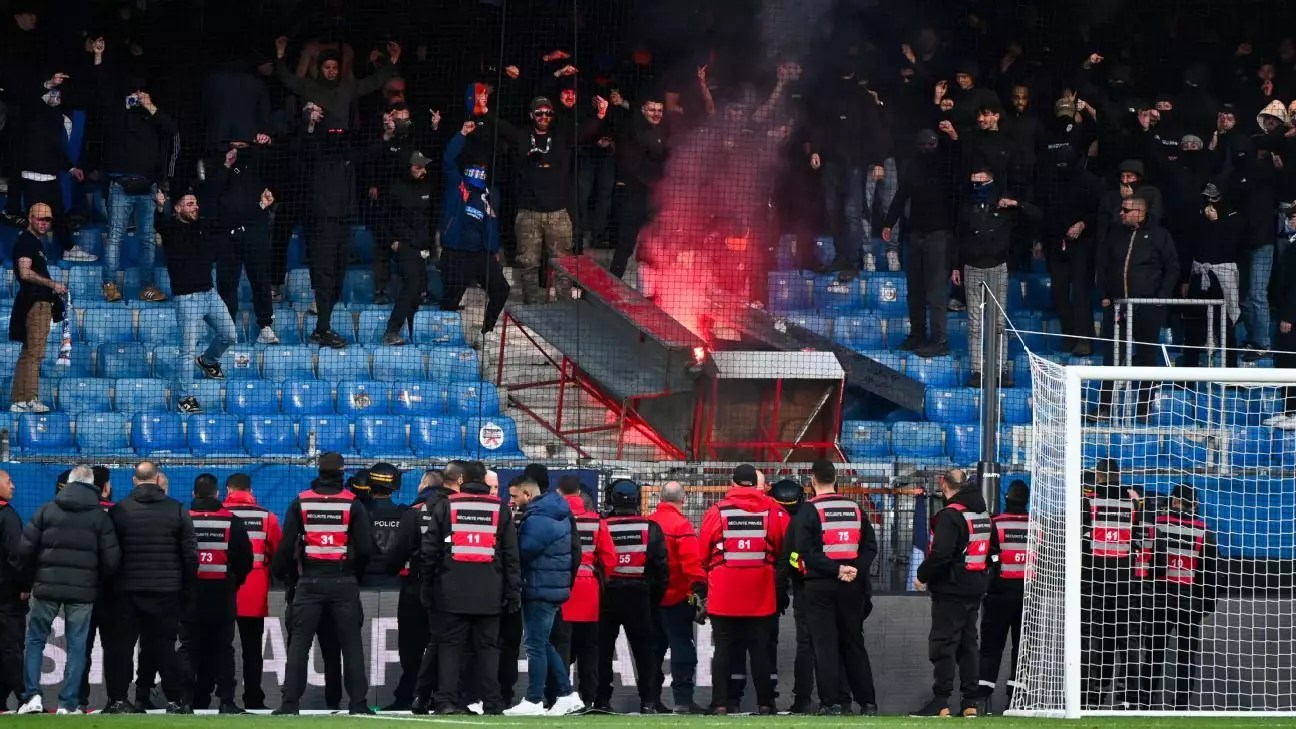In a distressing incident during a Ligue 1 match, Montpellier faced off against fellow relegation battlers Saint-Etienne, only for the game to be abruptly halted in the 63rd minute due to a dangerous fire that broke out in the stands. Fans, expressing their frustration through flares, inadvertently escalated the situation beyond mere theater of passion into a scenario wrought with peril. Far from a typical Sunday match, the bleak atmosphere of a struggling Montpellier—trailing 2-0 at that point—turned chaotic as smoke filled the air, and players were escorted back to their lockers to escape the raging flames.
This unsettling image, punctuated by the sight of black smoke billowing into the sky, has become emblematic of a concerning trend in football culture, where fan fervor often crosses over into destructive behavior. Local reports indicated that emergency services attended to a person who collapsed, underscoring a worrying undercurrent to the spectacle of sport that can quickly become life-threatening. The urgent need for enhanced security measures and better crowd control has never been more apparent.
A Fractured Community: The Burgeoning Risk of Violence
This alarming event is set against the backdrop of entrenched rivalry and increasing violence surrounding football matches in France. Authorities had already preemptively banned Saint-Etienne fans from attending the match due to previous disturbances, a move that was only partially effective given that chaos erupted regardless. This begs the question: are bans truly a solution, or are they just a temporary patch on a festering wound? The fire incident reveals a deeper issue within French football, one that calls for a national dialogue about the culture of support and its transformation from camaraderie to hostility.
The two clubs’ supporters’ groups, the Magic Fans and Green Angels, have voiced their concerns against governmental attempts to disband them. They argue that the motive behind these efforts is politically charged, dismissing the notion that dispersing passionate fan groups will genuinely address the violence prevalent in stadiums. Instead, the government’s tactics display a reactive rather than proactive approach, failing to engage with the real roots of the issue.
Montpellier’s Dismal Season: A Deeper Reflection
On the pitch, Montpellier’s struggles this season border on tragicomic; having claimed victory in a mere four of their 25 matches, they find themselves languishing in 18th place. The atmosphere inside the stadium, filled more with frustration than hope, reflects not only their deteriorating performance but also a nagging anxiety about relegation possibilities. While supporters are passionate about their club, this fervor often twists into rage, prompting violence both inside and outside the stadiums.
Saint-Etienne, a once-majestic guardian of French football’s history, now stands in solidarity with their supporters amidst the tumult. They have publicly opposed governmental measures that label their fanbase as inherently violent, inciting a divided narrative that sees clubs ranging from historical giants succumbing to modern-day turmoil—their once proud legacy overshadowed by violence and disorder.
The abandonment of the match between Montpellier and Saint-Etienne marks not just a failed sporting event, but a critical turning point in understanding the toxic elements that threaten the very integrity of football in France. Addressing these issues comprehensively demands not only reflection from clubs but also immediate actions from policymakers aiming to heal the scars of football culture marred by violence and unrest.


Leave a Reply